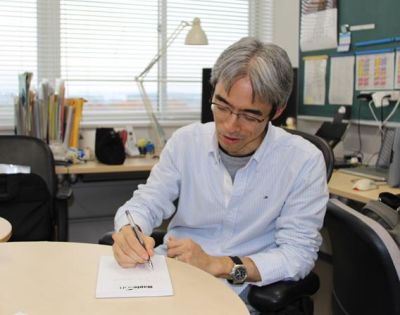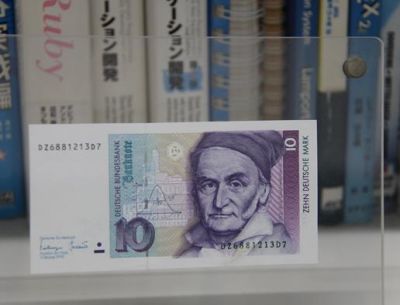TSUKUBA FUTURE
#049 Can a Robot Get Into university?
Associate Professor TERUI Akira, Faculty of Pure and Applied Science

There is something quite remarkable about the development of artificial intelligence. It has its practical applications, such as in smartphones etc, but on the other hand, in the not too distant future it may usurp many of the jobs normally undertaken by humans, and this could eventually be a threat to humanity. How close can artificial intelligence get to human thought and brilliance? This question is in the algorithms.
Mathematical problems, as studied in schools, can be solved in a relatively simple way if calculations are performed correctly according to the formulas. However, in problems encountered in the real world of science and engineering, variables can be enormous, factors can be very complex, and these often cannot be solved even if they are fitted into formulas. Prof. Terui has undertaken the development of a program which will enable computers to solve problems expressed in numerical formulas, in other words he has undertaken research to develop an algorithm for "formula manipulation." An algorithm is a calculation procedure. The order and number of calculations for solving a particular problem may differ depending on the solution strategy. When undertaking this kind of calculation on a computer, a strategy for efficient and precise solution is required.
Originally, the prerequisite for formula manipulation algorithms was that formulas free from errors be used. However, formulas used in the solution of real problems often include errors. Formulas which include errors cannot be solved properly with existing algorithms. The idea is to examine the extent of the errors and the precision of the solution while searching for conditions which will lead to a meaningful solution even if there are errors in the formulas, and thus come up with an algorithm which will pursue a meaningful solution to a problem, the formulas for which contain errors. Tsukuba has a long history in this field, and has been working on algorithms based on new ideas for a long time.
Prof. Terui is now widening his research challenges towards a new genre based on formula manipulation. One of these challenges is an artificial intelligence project entitled "Todai Robot Project." This is an attempt to have an artificial intelligence (named Todai Robot) sit a university entry exam and succeed in entering University of Tokyo. Prof. Terui's team is participating in the mathematical side of this project, which is being undertaken primarily by the National Institute of Informatics. Five of Prof. Terui's graduate students are taking part in the project, two of whom are developing algorithms for solving mathematical sequences and functions, and the other three have undertaken basic research into algorithms for the solution of mathematical problems.

Prof. Terui is an expert in using formulas and flow-charts to explain things.
Even though one may think that artificial intelligence should be able to solve mathematical problems easily, for some reason it doesn't work out that way. Computers can only deal with computer languages. Entrance examination problems, written in human language (natural language) must first of all be translated into logical formulas for computers. And not only this, the examination requirements are the same as those for humans in that all previously unseen problems must be solved by the examinee alone within the set time. For example, Robots are not able to understand many words which appear in the questions, such as "circle," "triangle," "pulley," and "spring," and do not have the brilliance to deduce rules from a sequence of numbers. It is very difficult to express in formulas simple facts we recognize from our everyday lives and the connections we see between them. Even if there were an algorithm able in principle to solve problems, depending on the specific problem there will be cases in which a solution cannot be reached within the set time, so in reality the algorithm still needs to be improved, and it may never be possible to create artificial intelligence which can solve proof problems and probability problems.

In his laboratory, he keeps an old 10 Deutsche Mark banknote featuring a portrait of the 19th-century mathematician Gauss and a diagram of his normal distribution.
From his early childhood Prof. Terui was familiar with computers and music, and until junior high school his dream was to become a horn player. He is still a member of an amateur orchestra and takes part in operas performed by professionals and amateurs. The horn and algorithms are completely different worlds. Prof. Terui's mind is refreshed when he plays the horn, and this enables him to concentrate on his research. He first became interested in mathematics when he went to high school. When he became interested in artificial intelligence, an unknown field at the time, and thought of studying informatics, he says he was advised by his maths teacher, an alumnus of the University of Tsukuba, to study mathematics if he wanted to venture into computer research. Even though mathematics wasn't his strongest subject, he took the advice he had been given and joined the mathematics club run by that same teacher, and started studying the aspects of mathematics he found interesting.
This year (2015), Todai Robot surpassed the grade Prof. Terui attained in the National Center Exam for University Admissions he took when he decided to study mathematics. However, humans possess wondrous abilities which cannot be measured in examination papers. One day, artificial intelligence may exceed these abilities. But it is humans who will create the algorithms which will enable humans and artificial intelligence to work in concert. Computer technology is developing by leaps and bounds, including the field of hardware, and the number of problems solvable by computers is increasing exponentially. Alongside this, more and more problems we want to solve are being discovered, and so this is a task that will never be exhausted.
Article by Science Communicator at the Office of Public Relations


